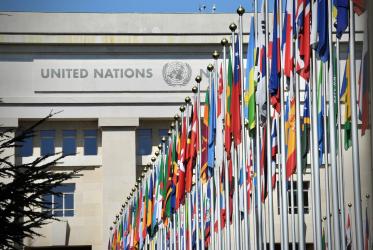Cf. WCC Press Update PU-03-44 of 14 November 2003
Cf. WCC Press Update PU-03-43 of 13 November 2003
Cf. WCC Press Update PU-03-42 of 11 November 2003
Cf. WCC Press Release PR-03-33 of 6 November 2003
Free high-resolution photos available - see below
Two advocates for peace and human rights outlined principles for international intervention - including the possibility of military action - where violence or genocide threaten basic human rights at a 13 November public forum entitled "The responsibility to protect". The forum was part of a World Council of Churches (WCC) International Affairs and Advocacy Week in New York.
For Permanent Mission of Canada to the United Nations minister councillor Gleyn Berry, preventing or ending violence and atrocities has been the theme of a "millennia-long conversation". The subject remains particularly relevant, Berry said, in view of such modern-day examples as the killing fields in Cambodia and the genocidal slaughter of innocents in Kosovo and Rwanda.
"The goal of international efforts is to prevent such incidences of violence before they occur," he said, explaining that the underlying principle is to move nations and international bodies towards recognition of internationally recognized norms and laws so that neither prevention nor intervention is ultimately necessary.
The proper role of government
Although conversations are under way in international bodies and among nations, it is important to remember that they should remain centered within the context of the well-being of individual human beings, Berry reminded the forum participants. "Inherent in this notion is that it is the proper role and responsibility of government to protect all its citizens."
For Berry, "there is such a jealous protection of the sovereignty of the nation state" in the modern world that the concept of international jurisdiction in areas of human rights and the prevention of atrocities "is extremely sensitive".
The international community represented by the United Nations "is not ready for a serious debate on the obligations of sovereignty". Thus a "broader definition of sovereignty" that does not focus narrowly on military and political control of a specified territory, but rather "on the obligations of nation states to protect the human rights of their citizens" is needed.
Acknowledging that the attempt to develop an international consensus on this subject will "require a long-term effort to change norms," he insisted that the conversation must be broadened beyond the UN to include civil society, NGOs, political parties and other interest groups, and communities of faith.
'Human security'
Noting that "at present, there is no consensus among those responsible for international law or policy making" about when to consider international action, WCC general secretary Rev. Dr Konrad Raiser urged participants to employ the WCC’s concept of "protection" over "intervention". This shift in terminology "broadens the perspective by adopting the wider principle of ‘human security’ over against the narrow understanding of ‘national security’," he suggested.
Raiser highlighted an inherent tension in the UN Charter between "the prohibition of intervention in the internal affairs of sovereign states, and the affirmation of the universal validity of human rights and recognition that the observance of human rights and fundamental freedoms for all is essential for international peace".
Asserting that Christians "cannot escape making decisions involving moral and ethical uncertainties," Raiser noted that the ecumenical movement itself contains believers who differ about whether the teachings of Jesus allow the use of armed force. He noted that some uses of force are commonly accepted throughout the international community - such as the creation of police forces to defend individual rights and security, or the use of force in cases of individual self-defence.
Yet, Raiser reminded his audience, such accepted uses of force are held with certain limits: nearly all nations distinguish between the roles of police and military, and most nations submit policing functions to judicial examination.
Who decides?
Raiser posed some crucial questions on the use of force on the international level. "Who makes the assessment that human security in a given state is endangered to such an extent that protection becomes a concern for the international community, and on the basis of what criteria?" he asked. "Who has the legitimate authority to take this decision on behalf of the international community?"
A decision to intervene "cannot be based solely on moral arguments, or on grounds of political expediency; it should pass through the trustees of the rule of law," Raiser insisted. Since the UN Security Council currently acts "both as trustee of international law and as the enforcing authority," the current configuration is "politically and ethically unsatisfactory, and opens the door to selective and arbitrary decisions," he suggested.
Principles for protection
There is an emerging consensus around the globe to recognize such international tribunals as the International Court of Justice and the International Criminal Court. But until that consensus is universally accepted, some general principles are needed to protect endangered populations, Raiser said.
"In a situation of a dramatic breakdown of public order and the inability or unwillingness of the existing government to protect citizens, the basic objective of any international intervention must remain to re-establish a functioning framework of government which can assume the responsibility to protect - however imperfectly," he said.
However, a military intervention "causing disproportionate numbers of civilian casualties and vast damage to civilian infrastructure in violation of the Geneva Convention cannot be considered ‘humanitarian,’" Raiser argued. Any military protection must be "proportional" to the scale and scope of the conflict, and "even military protection for humanitarian action can compromise its objectives," he warned.
"Human rights cannot be enforced by military means. In contrast to military logic, it is precisely the purpose of international humanitarian law to protect the rights and dignity of people in situations of war," Raiser asserted.
The text of Rev. Dr Raiser's presentation is available on our website:
www.wcc-coe.org/wcc/what/international/kr-ny-03.html
Free high-resolution photos from the WCC New York Advocacy Week are available on our website:www.wcc-coe.org/wcc/churchcenter-ny.html
The complete programme of public seminars of the Advocacy Week and biodata about the key speakers are available at:






